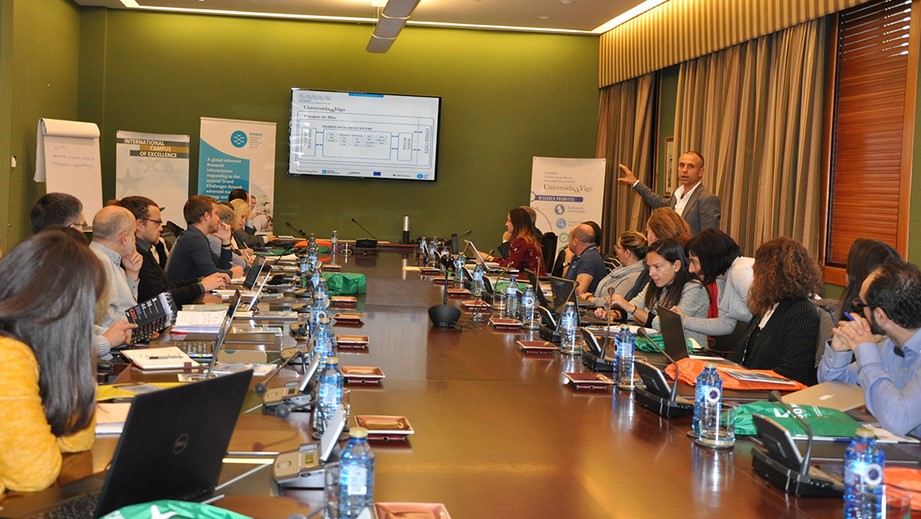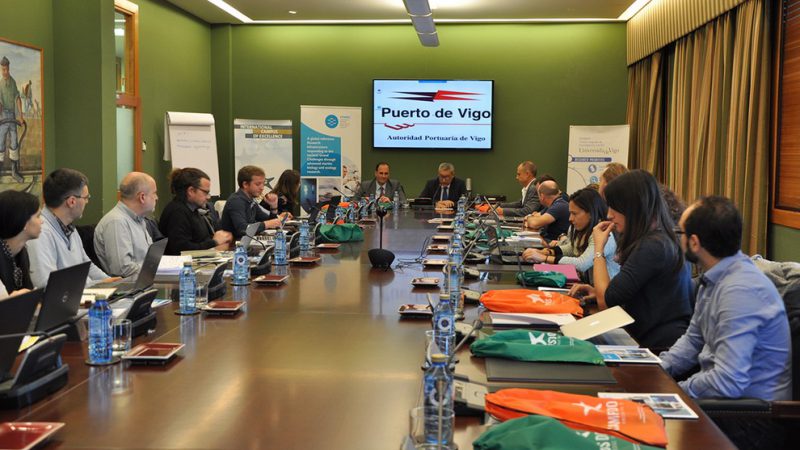The kick-off meeting for the European Marine Biological Resource Centre Biobank (EBB) project took place in Vigo on the 21st and 22nd of November 2017. The main objective of this project, led by the Marine Research Center of the University of Vigo, is to create the largest and most diverse marine biobank in the world. It is funded through the Interregional Cooperation Programme in the Atlantic Area (INTERREG: Atlantic Area) with 1.5 million euros, with a further 500,000€ co-funding by the project partners. Over the next three years, new technologies and common protocols for the ex-situ maintenance of marine biological resources will be developed, and existing ones will be harmonized. All with the goal that the different biobanks work in a coordinated manner under the umbrella of the European Marine Biological Resource Centre (EMBRC).
The project will also develop best practice guidelines on how to comply with the new legislation on access to genetic resources, deriving from the Nagoya Protocol. This legislation was developed within the framework of the Convention on Biological Diversity of the United Nations, with the objective of protecting the interests of the countries of origin of the resources. It is currently in the implementation phase at national level and represents an important bureaucratic barrier to entities interested in carrying out research utilizing genetic resources.
The project participants include some of the world´s most important marine biobanks, located in Norway, Ireland, United Kingdom, France, Spain and Portugal; four clusters of marine biotechnology from Spain, France, Portugal and the United Kingdom; six companies active in the field of marine biotechnology; and the competent national authorities on access to genetic resources from Spain, Portugal and the United Kingdom.
Launching of the EBB project
The kick-off meeting, organized by the University of Vigo, was held on November 21 and 22, at Vigo’s Port Authority facilities. It was the first time all project partners met in person. The meeting was opened jointly by Jesús Souza Troncoso, director of UVigo Marine Research Centre and Carlos Botana, responsible of Sustainability at the Port of Vigo. “This is the first initiative to promote a long-term transnational coordination of marine biobanks,” said Souza Troncoso, explaining that, as a marine biologist, he usually has to collect samples around the world or apply for loans from museums, universities or marine stations. “This is a difficult issue, as each country has its own regulations and protocols. Therefore, this initiative to implement a common strategy towards accessing marine biological resources is paramount, “said Troncoso, who as an example detailed how he had traveled to the United States the previous week to visit Harvard University. “I took with me a jar with several samples collected a few years ago in Antarctica and, upon arrival at Harvard’s museum, I had to complete a long series of forms; if I had travelled to another country, the requirements would have been completely different,” Troncoso highlighted
Carlos Botana stressed the close relationship maintained between the Port of Vigo and the University of Vigo, “as it could not otherwise be, in a city that lives off the sea, as in Vigo’s case”. Vigo’s port planning strategy, called Blue Growth, aligns perfectly with the EBB project objectives and promotes the creation of sustainable quality employment linked to the sea. ” For the Port of Vigo, we have identified 14 sectors linked to the blue economy, from biotechnology, fishing and tourism, to blue energy and sea highways” said Botana.
Following the inaugural session, the day started with a general presentation of the project, carried out by Antonio Villanueva, project coordinator and responsible for marine research infrastructures at the University of Vigo, after which a tour de table was carried out where the different partners presented themselves and their own entities.
Throughout the two days, the work plan for the coming months was established and the main roles and responsibilities of the partners was agreed upon. “The University of Vigo is responsible for the coordination of the entire consortium and that will require a big effort” Villanueva noted.

Antonio Villanueva presenting UVigo Marine Research Centre
The meeting participants, besides various representatives of the University of Vigo, included experts from the University of the Basque Country, the Interdisciplinary Center for Marine and Environmental Research of Portugal, the University of the Algarve, the Pierre and Marie Curie University, the Marine Research Institute of Norway, Fórum Oceano, Pôle Mer Bretagne Atlantique, Anfaco-Cecopesca, the Industrial Biotechnology Innovation Centre of the University of Strathclyde, the Association of Marine Biology of the United Kingdom, and the National University of Ireland.
Source: Duvi

